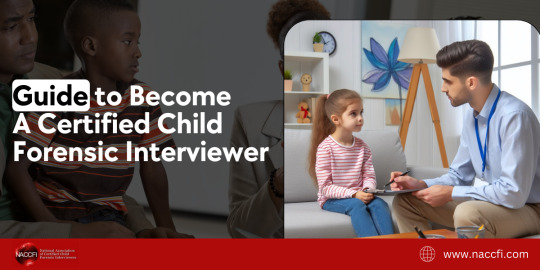The National Association of Certified Child Forensic Interviewers (NACCFI) stands as the singular professional credentialing entity dedicated to child forensic interviewers within the United States. Established on June 16, 2006, NACCFI is founded on the fundamental belief that the delicate task of conducting child forensic interviews demands the expertise of rigorously trained and credentialed professionals.
Don't wanna be here? Send us removal request.
Text
A Comprehensive Guide to Become a Certified Child Forensic Interviewer

Child forensic interviewing is a specialized field aimed at eliciting accurate and reliable information from children who may have been victims or witnesses of crime. Acquiring forensic interviewer certification involves learning specific skills, knowledge, and training to conduct these sensitive interviews effectively. In this guide, we will delve into the intricacies of child forensic interviewing and provide a roadmap for those aspiring to become certified in this vital profession.
What is a Child Forensic Interview?
Child forensic interviewing is a structured process designed to obtain information from children about their experiences in a non-leading, developmentally appropriate, and legally defensible manner. These interviews are conducted by trained forensic child interview specialists who possess expertise in child development, communication techniques, and forensic procedures. The primary goal is to gather accurate information while minimizing the risk of suggestibility or provocation.
Can a Forensic Interviewer Tell If a Child is Lying?
Determining the truthfulness of a child's statement during a forensic interview is a complex task. While there are no foolproof methods to ascertain absolute truthfulness, certified forensic interviewers rely on a combination of verbal and non-verbal cues, along with adherence to established protocols, to assess the credibility of a child's disclosure. It is essential to approach each interview with objectivity, empathy, and an understanding of factors that may influence a child's behavior and responses.
Is Child Forensic Interview Training Available Online?
Yes, there are reputable organizations and institutions providing child forensic interview training online. These programs offer comprehensive coursework covering topics such as child development, trauma-informed interviewing techniques, legal considerations, and ethical standards. It is crucial to select training programs accredited by recognized professional organizations, such as the National Association Of Certified Child Forensic Interviewers (NACCFI), and to supplement online learning with hands-on practice and mentorship opportunities.
What Exam Shall I Take to Become a Certified Child Forensic Interviewer?
The certification process for Child Forensic Interviewers varies depending on the accrediting body and jurisdiction. However, one recognized ethically certified forensic interviewer exam/test is offered by the National Association of Certified Child Forensic Interviewers (NACCFI). Candidates must complete a specified number of training hours, demonstrate proficiency in forensic interviewing skills, and pass a rigorous examination assessing their knowledge and competence to become a certified child forensic interviewer.
Learn More About Child Forensic Interview Structure
A thorough understanding of the structure and principles underlying child forensic interviews is essential for aspiring certified forensic interviewers. Familiarize yourself with best practices for rapport-building, question formulation, memory retrieval techniques, and cultural considerations. Stay updated on advancements in child forensic interview structure or model and legal standards to ensure adherence to the highest professional credibility.
#Child Forensic Interview#certified forensic interviewers#child forensic interview training online#NACCFI#certified forensic interviewer exam/test#child forensic interview structure
0 notes
Text
What Are The Five Phases Used In Child Forensic Interviewing?

Forensic interviewing, characterized by its structured and systematic approach, plays a pivotal role in legal and law enforcement investigations. This methodical process, encompassing various forensic interview models and protocols, ensures the extraction of accurate and reliable information from individuals involved in a case.
1. Introduction and Rapport Building:
The forensic interview structure begins with the crucial phase of introduction and rapport building. Interviewers adeptly introduce themselves, articulating the purpose of the interview and following established forensic interview protocols. This phase lays the groundwork for trust and rapport with the interviewee, a foundational element in both general forensic interview structure and specialized child forensic interview structures.
2. Background Information:
Within the broader forensic interview model, the second phase involves the meticulous gathering of essential background details. Interviewers follow forensic interview protocols to collect comprehensive information about the interviewee's personal life and relationships, ensuring a holistic understanding of the case. This phase is particularly crucial in both general and child forensic interview structures.
3. Open-Ended Narrative:
At the heart of the forensic interview structure lies the open-ended narrative phase. Here, interviewers adhere to established forensic interview models, allowing the interviewee to recount events in a chronological and unstructured manner. This phase is critical not only in the general forensic interview structure but also in specialized child forensic interview structures, ensuring the preservation of the interviewee's perspective.
4. Focused and Probing Questions:
Transitioning within the forensic interview model, the fourth phase involves the use of focused and probing questions. Interviewers, guided by forensic interview protocols, ask specific questions to refine information. This phase is instrumental in enhancing accuracy, ensuring a comprehensive understanding of events in both general and child forensic interview structures.
5. Closure and Summary:
The closure and summary phase, integral to the forensic interview structure, is conducted with professionalism and adherence to established protocols. Interviewers recap key points and address remaining questions, preparing the interviewee for potential follow-up actions. This phase serves as a considerate conclusion, emphasizing the professionalism inherent in forensic interview models.
In conclusion, forensic interviewing, encompassing a variety of models and protocols, demands a high level of professionalism, expertise in communication techniques, and a thorough understanding of legal considerations. This approach ensures the reliability and admissibility of information, upholding the integrity of the investigative process in both general and child forensic interview structures.
0 notes
Text
What Are Best Practices When Forensically Interviewing A Child?

When it comes to forensic interviews of children, the stakes are high, and the process requires a delicate touch. Certified forensic interviewers, armed with specialized training, play a pivotal role in extracting accurate information while safeguarding the well-being of the child involved.
Building Trust through Certified Expertise
Certified forensic interviewers bring a unique skill set to the table, emphasizing the establishment of trust and rapport with the child. Their training equips them to create a supportive environment, ensuring that the child feels safe and comfortable throughout the interview.
Age-Appropriate Communication
One key aspect of forensic interview training is mastering age-appropriate communication. A certified forensic interviewer tailors their language to the child's developmental stage, steering clear of jargon and employing open-ended questions to encourage the child to express themselves freely.
Recognizing Developmental Factors
Understanding the developmental nuances of children is crucial in forensic interviews. Certified professionals adapt their techniques based on the child's cognitive abilities, recognizing limitations in memory, attention span, and comprehension of abstract concepts.
Neutral Settings for Unbiased Accounts
Certified forensic interviewers prioritize conducting interviews in neutral settings. This strategic choice helps eliminate potential distractions or intimidation factors, allowing the child to share information without undue influence.
Involving Trained Professionals
Forensic interviews of children should exclusively be conducted by certified professionals with specialized training in child forensic interviewing techniques. These experts are attuned to the impact of leading questions and employ non-intrusive techniques to extract reliable information.
Non-Intrusive Techniques for Authentic Accounts
A hallmark of certified forensic interviewers is their mastery of non-intrusive techniques. Steering clear of suggestive methods, they use open-ended questions to elicit authentic accounts from the child, avoiding any potential contamination of the information.
Documenting the Process
Certified forensic interviewers understand the importance of meticulous documentation. Every detail, from the context to the child's responses, is documented thoroughly. This comprehensive record becomes invaluable for legal purposes, ensuring the accuracy and reliability of the information gathered.
Emotional Support in the Interview Environment
Certified professionals prioritize creating a supportive environment during forensic interviews. Recognizing the potential emotional impact on the child, they allow the presence of a support person, such as a caregiver, to provide emotional reassurance throughout the process.
Continuous Training and Professional Development
The field of forensic interviews of children is dynamic, and certified forensic interviewers are committed to continuous training and professional development. Staying abreast of the latest research and best practices ensures they are equipped with the most effective techniques.
In conclusion, the art of forensic interviews of children is a specialized field where certified forensic interviewers play a crucial role. Through their unique skills, these professionals prioritize the child's well-being, employ age-appropriate techniques, and stay at the forefront of best practices, unlocking the secrets while maintaining the integrity of the process.
1 note
·
View note